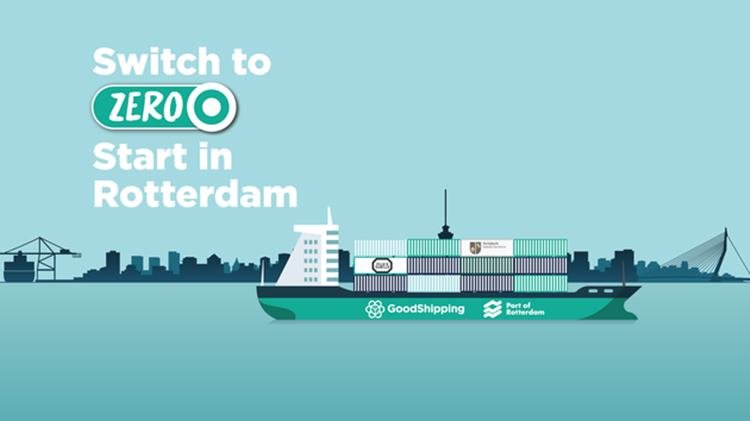Launch of ‘Switch to Zero’ campaign to reduce shipping industry carbon emissions, Companies that import or export their freight by vessel generally have little influence on the container shipping company’s fuel choice. GoodShipping aims to change this with the ‘insetting’ concept. The Port of Rotterdam Authority and GoodShipping are conducting a joint campaign to inform companies of this concept so they can have part, or all of their sea freight transported via sustainable fuel
The aim of the ‘Switch to Zero’ campaign is to get some twenty sea freight shippers on board. Swinkels Family Brewers, known for brands including Bavaria and Cornet, and Dille & Kamille are the first to announce their participation in this campaign. They will have some or all of their containers shipped using sustainable fuel next year.
Insetting as impact mechanism
Insetting does not involve achieving carbon reductions through compensation (offsetting by planting trees, for example) but through shipping using sustainable fuel. Shippers often transport small numbers of containers on different vessels and can use insetting to purchase a certain amount of carbon reduction via GoodShipping. GoodShipping ensures that this is achieved by providing a vessel with sustainable fuel. This does not need to be the same vessel on which the containers are transported.
Campaign to get new shippers on board
As part of their drive to promote CO2 savings in the logistics sector, GoodShipping and the Port of Rotterdam Authority aim to find some twenty new sea freight shipping companies that wish to use this service. The campaign makes it easy to get involved and make a concrete contribution to reducing carbon emissions. The aim is for joint vessel bunkering with these shippers to reduce the amount of carbon released into the atmosphere by 2023 tonnes. This is comparable to the amount of carbon released when transporting some 15,000 TEU containers between Rotterdam and Gothenburg.
Allard Castelein, Port of Rotterdam Authority CEO: ‘Shipping is not yet on schedule to be carbon neutral by 2050. We are working with partners to develop a range of initiatives to help make logistics more sustainable: from battery-powered inland shipping to shore power for sea-going vessels, and from bio-kerosene production for aviation to so-called Green Corridors for sea-going vessels. The 2023 tonne reduction through sustainable fuel use is just the start. We want to show that it can be done and start the discussion, with the aim of scaling up and reducing carbon emissions even further. The transition tempo needs to step up.’
Dirk Kronemeijer, CEO Dirk Kronemeijer, CEO GoodShipping: ‘We’ve seen a huge acceleration in the pace of the energy transition brought about by shippers over the past two years, which is why we want to give more companies the opportunity to have their freight shipped sustainably. The Port of Rotterdam Authority aims to be the world’s most sustainable port and it was an obvious choice for GoodShipping to support that. With the Switch to Zero campaign, we’re making it easy for companies to enhance the sustainability of their transport without complex supply chain adaptations.’
Harold Reusink, Supply Chain Manager at Dille & Kamille: ‘At Dille & Kamille, we aim to further enhance the sustainability of our range, which is why we are working with GoodShipping for our overseas transport. What is fantastic about this partnership is that it also inspires others to consider more sustainable options. This creates a chain reaction within a traditionally conservative chain, simply because people start asking new questions about how transport is organised.’
Fred Hooft, Global Logistics Manager at Swinkels Family Brewers: ‘We want our operations to be fully circular, which is why we’re looking at the carbon emissions of our transport. The Switch to Zero campaign is a great first step to explore how we can make our sea transport more sustainable. Hopefully this initiative will stimulate more companies to take this step and enable us to jointly make the difference to reduce our impact on the environment and climate.’
The GoodShipping and Port of Rotterdam Authority campaign to recruit some twenty shippers starts on 5 December, but Dille & Kamille and Swinkels Family Brewers have already signed up. Participating companies can opt for carbon reduction of 75, 100 or 125 tonnes. GoodShipping and the Port Authority are giving a substantial discount per tonne carbon reduction to make it attractive for companies to find out more about this approach.
Only genuinely sustainable advanced biofuels
Shipping is responsible for approximately 3% of global carbon emissions but, at the same time, is a complex sector that fell outside the international climate agreements for a long time. The chain is also fragmented because companies often only ship just a few containers on a vessel.
Dutch company GoodShipping is a global market leader in insetting, the service for shippers and producers to enable sea-going freight to be transported using sustainable fuels instead of traditional fossil fuels. This form of insetting accelerates the energy transition in the transport sector. The initiative does not lie with shipping companies, but with freight owners. GoodShipping already works for companies including DHL, IKEA, BMW, Tony’s Chocolonely, Beiersdorf and Kings of Indigo. The fuel is produced from certified sustainable flows including frying oils and animal fats that are labelled as 100% waste and cannot be used in higher grade products. These so-called advanced biofuels also do not compete with the food chain and production does not affect important ecosystems such as the rainforest. This is monitored by an independent sustainability board.
Media & Press Release Port of Rotterdam

